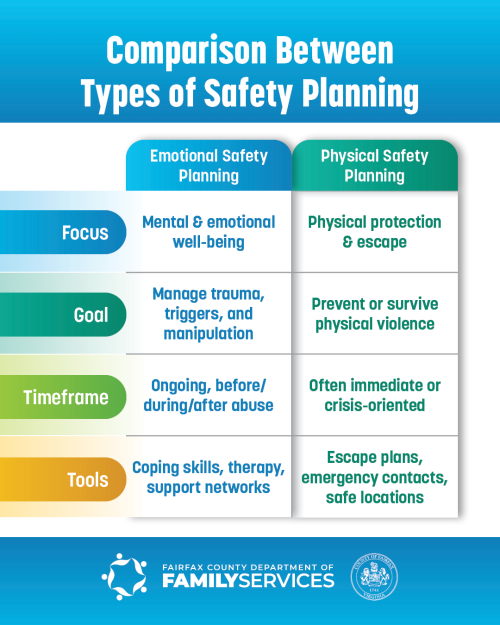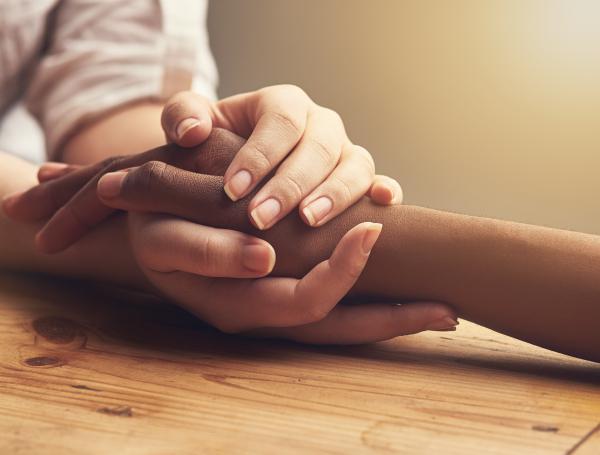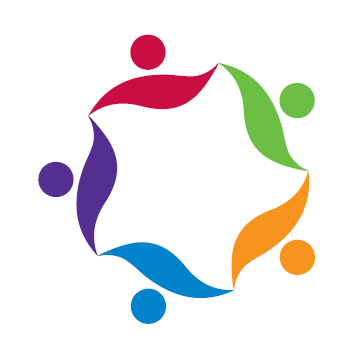
SAFETY ALERT – If you are in danger, call or text 911.


SAFETY ALERT – If you are in danger, call or text 911.
The Department of Family Services' Domestic and Sexual Violence Services offers compassionate and comprehensive state-accredited programs for adults, teens, and children who have been impacted by domestic and sexual violence, stalking, and human trafficking.
Free, short-term individual and family counseling services are now available via teletherapy. Call us at 703-324-5730 and choose the option for Counseling Services. The DSVS 24-hour hotline is still available 703-360-7273.
National Resources
State Resources
Local Resources
Domestic Violence Action Center (DVAC)
Historic Courthouse
4000 Chain Bridge Road, Suite 2702
Fairfax, VA 22030
703-246-4573, Email
Walk-in services are temporarily unavailable at DVAC. All DVAC walk-ins should go to the Pennino Building, 12011 Government Center Parkway, 7th floor, Fairfax, VA 22035, Monday-Friday, 8 a.m.-4:30 p.m. (excluding holidays). For assistance, call 703-246-4573 or the Domestic and Sexual Violence 24-Hour Hotline at 703-360-7273.
Fairfax County Community Services Room
Tysons Corner Center
1961 Chain Bridge Road (2nd Level outside of Nordstrom)
McLean, VA 22102
703-246-5995, Email
Wednesdays and Fridays 10:30 a.m.-7 p.m.
(If you arrive before 10 a.m., please use Parking Deck A, located across from the Michael Kors store. Enter the mall through the entrance situated between Michael Kors and Maman Joon.)
Herndon Neighborhood Resource Center
1086 Elden Street
Herndon, VA 20170
Email
Wednesdays, 9 a.m.-5 p.m.
Herndon Connections for Hope
1141 Elden Street, Suite 200
Herndon, VA 20170
Email
Tuesdays, 9 a.m.-5 p.m.
InovaCares Clinic for Women and Children
6400 Arlington Boulevard
Falls Church, VA 22042
Email
Mondays and Wednesday, 9 a.m.-5 p.m.
Pennino Building
12011 Government Center Parkway, Suite 740
Fairfax County, VA 22035
703-324-5730, Email
Monday-Friday, 8 a.m.-4:30 p.m.
Interested in more articles about Domestic and Sexual Violence programs, services and resources? Check out the DSVS news page or variety of helpful topics.
 We often emphasize physical safety, but do not consider a survivor’s emotional well-being when helping them create a safety plan. Of course, emotional safety looks different for different people, but planning for emotional safety is about developing a personalized plan that helps survivors feel comfortable about their emotions and decisions when dealing with abuse.
We often emphasize physical safety, but do not consider a survivor’s emotional well-being when helping them create a safety plan. Of course, emotional safety looks different for different people, but planning for emotional safety is about developing a personalized plan that helps survivors feel comfortable about their emotions and decisions when dealing with abuse.
Of course, both emotional and physical safety planning are essential and interconnected. But even after physical safety is secured, emotional wounds may linger. Survivors often say emotional safety planning helps them heal, rebuild trust, and regain independence long after the danger has passed. Learn more about the differences between emotion and physical safety planning.
 Maybe someone you care about has told you they are experiencing domestic violence. Or you see signs of abuse in their relationship. You may wonder what to say to help—or if you should say anything at all. That’s OK. Domestic violence is a difficult subject to talk about both for people experiencing the violence and those who care about the victims. But reaching out can be a lifeline to someone who probably feels fear, shame, or embarrassment. Here are some practical, safety-focused tips for helping a victim of domestic violence.
Maybe someone you care about has told you they are experiencing domestic violence. Or you see signs of abuse in their relationship. You may wonder what to say to help—or if you should say anything at all. That’s OK. Domestic violence is a difficult subject to talk about both for people experiencing the violence and those who care about the victims. But reaching out can be a lifeline to someone who probably feels fear, shame, or embarrassment. Here are some practical, safety-focused tips for helping a victim of domestic violence.
 All relationships need healthy boundaries--appropriate behavior that keeps everybody in the relationship safe. This is especially true in intimate partnerships. And, in an age where our lives are increasingly lived online, it is crucial that we set digital boundaries, as well. What do healthy digital boundaries look like? Find out.
All relationships need healthy boundaries--appropriate behavior that keeps everybody in the relationship safe. This is especially true in intimate partnerships. And, in an age where our lives are increasingly lived online, it is crucial that we set digital boundaries, as well. What do healthy digital boundaries look like? Find out.
 Unscripted: Conversations about Sexual and Domestic Violence is a podcast featuring employees and subject matter experts from Domestic and Sexual Violence Services and partner organizations discussing all aspects of interpersonal violence, while providing prevention strategies, solutions, and resources for support for residents of Fairfax County.
Unscripted: Conversations about Sexual and Domestic Violence is a podcast featuring employees and subject matter experts from Domestic and Sexual Violence Services and partner organizations discussing all aspects of interpersonal violence, while providing prevention strategies, solutions, and resources for support for residents of Fairfax County.
Fairfax County is diverse, and supporting immigrant communities that have experienced violence requires sensitivity and understanding of their unique challenges. On this episode of Unscripted, host Kendra Lee talks with Domestic and Sexual Violence Services’ Advocacy Services supervisor Lydia Guirguis, victim advocate Soo Jin Kim, and counselor Jeannette Aleman about the ways we support immigrant survivors of interpersonal violence.
 Domestic and Sexual Violence Services works with communities to transform society’s response to domestic violence, sexual violence, human trafficking, and stalking by challenging oppression, collaborating to inform policy, and providing everybody impacted by violence with equitable access to trauma-informed support, advocacy, education, and a space for healing. Check out this article about the value of working with Fairfax County Domestic and Sexual Violence Division.
Domestic and Sexual Violence Services works with communities to transform society’s response to domestic violence, sexual violence, human trafficking, and stalking by challenging oppression, collaborating to inform policy, and providing everybody impacted by violence with equitable access to trauma-informed support, advocacy, education, and a space for healing. Check out this article about the value of working with Fairfax County Domestic and Sexual Violence Division.
All services are confidential, free, and provided regardless of race, gender, ethnicity, national origin, age, disability, religion, gender identity, or sexual orientation.
For media inquiries, contact Department of Family Services' Public Information Officer Amy Carlini by email, office phone 703-324-7758 or mobile phone 571-355-6672.
 Fairfax County Department of Family Services is on Facebook
Fairfax County Department of Family Services is on FacebookLike and Follow us on Facebook at @FairfaxCountyFamilyServices for news, events, tips, stories and training opportunities. We support families and county residents of all ages and stages of life. Join our online community and engage with us through social media. #FairfaxCountyFamilyServices
